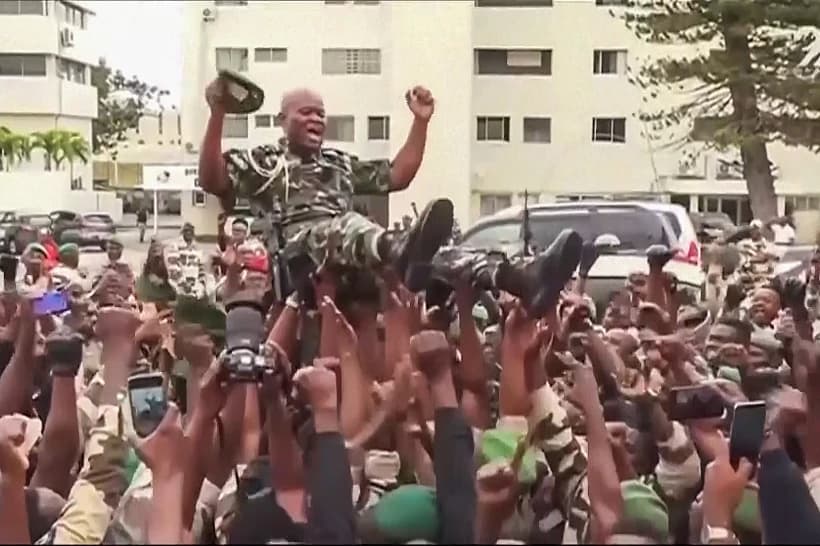Gabon’s leading bishop says “the leaden cloak that weighed on” the African country seems to have disappeared and people can “breathe a sigh of relief.”
The central African country’s military leaders have said they plan to hold a general election in August 2025.
General Brice Oligui Nguema seized power in August from his cousin, Ali Bongo, vowing to rescue the country from a “severe institutional” crisis.
Gabon – with a population of 2.3 million – had been ruled by the Bongo family for 55 years.
“The leaden cloak that hung over the country seems to have dissolved,” Bishop Jean-Vincent Ondo Eyene of Oyem told Agenzia Fides.
“We have experienced difficult moments, including in the Church, with the previous regime in its final phase. It was a tough government. In our prophetic role we have drawn attention to this, especially during last year’s elections,” the bishop said.
Ali Bongo was re-elected in August, extending his families over 50-year rule. He first took office in 2009, replacing his father, Omar Bongo, who ruled from 1967.
Ondo Eyene said the bishops invited the government to the Mass at the conclusion of their 2023 Plenary Assembly.
“The authorities did not appreciate the compassion of the homily, which was not addressed in particular to them but to all the political parties, calling on them to get out of the vicious circle of holding elections in which we declare a winner and a loser, which in turn calls the people onto the streets, with the police ultimately shooting at demonstrators,” the bishop said.
“And after all this, the dialogue begins for the division of the ‘cake’, i.e. public funds. This approach has brought nothing to the development of the country. The old government did not understand this message of ours, which called on everyone, not just them, but all political parties and the people themselves, to abandon this disastrous approach,” he added.
The Gabon bishop said the Church leaders “thank the Lord” the population seems content after the events of August 30, saying, “the leaden cloak that weighed on it seems to have disappeared and people can breathe a sigh of relief. But we always remain cautious.”
“Gabon needs to bring order to the management of its oil resources, which are a gift from God that must benefit the majority of the population. Until now, there have been families who have had a very high share of the oil revenue,” Ondo Eyene told Agenzia Fides.
“There is an ongoing debate about how to better distribute oil wealth. The new Head of State is trying to do this by initiating new projects to build infrastructure, housing, schools and hospitals,” he said.
The official language of Gabon is French, which ruled the country until 1958, and the majority of the country – 76 percent – are Christian.
“Our Church was founded by missionaries, and this year, on Nov. 29, we celebrate 180 years of evangelization. As you can see, today there are no longer any missionary bishops, only local clergy,” the bishop said.
“In order to become ever more faithful to the mission of the Gospel, we want to strengthen episcopal and pastoral unity. The faith is also manifested in shared facilities such as a major seminary, which we want to realize in the near future,” he added.
Ondo Eyene told Agenzia Fides Gabon is a peaceful and welcoming country, and “when we talk about hospitality, it means that we welcome people of all kinds and from everywhere.”
“So the ecumenical dialogue works very well. For example, in my province, where there are many Protestants, during my pastoral visits I experience that the Protestants say to the Catholics: ‘We welcome your bishop’. In families one can find believers moving from one church to another. This means that we meet at festivals,” the bishop said.
“As for the spread of sects, they exist in large cities, but not in the countryside,” he added.
Gabon’s ruling junta said the proposed timetable for elections was not final and would need approval from the public during town hall-style meetings in April.
A new constitution is scheduled to be presented in October and adopted by the end of that year in a referendum.















